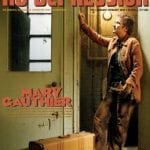Mando Saenz – Life’s little ups and downs
Mando Saenz’s career consists of snakebites and lucky charms. He’s had his breaks, but he’s taken some haymakers on the chin, too. After getting an M.B.A. at Incarnate Word in San Antonio, the native of San Luis Potosi, Mexico, waited tables around Houston to support an open-mike habit. By early 2002, he’d honed his chops and his songs and scraped together enough cash to record at Tommy Detamore’s studio in Floresville.
Though still a virtual unknown on the Houston scene, Saenz got a label offer, and his debut disc Watertown appeared to a few glowing reviews. But within weeks of the release, distributor Southwest Wholesale declared bankruptcy, and Watertown was essentially DOA. “I think I sold about 300 copies, mostly in Corpus and Houston,” he says.
Saenz was on a tour-from-hell with Houston buddy Hayes Carll when his luck turned. “Frank Liddell’s sister Lise sang on my record,” he says, referring to the veteran Music Row exec who has worked with Lee Ann Womack, Bruce Robison, Chris Knight, and others. “I didn’t know it, but she’d sent him a copy and kept bugging him to listen to it. Apparently she was pretty persistent. He told her once he’d lost the CD. She just sent him another one.”
Saenz and Carll were in Memphis after a grueling East Coast winter run when Liddell asked Saenz to come to Nashville. After informal discussions (“we had a few beers”), Liddell signed Saenz to a contract with Carnival Music, his publishing company and fledgling record label. Suddenly Saenz had cash in his pocket and a future in music. It was a rather strange turn of events for an artist who has yet to attract a following in his hometown.
“What a bizarre business,” Saenz muses. “I’m scrounging for gigs, playing for nobody, then totally out of the blue I’m signed to a deal. Stuff like that, you really don’t know how you should take it.”
Liddell says he didn’t see a diamond in the rough, but rather something fairly polished yet out of the ordinary. The first thing that grabbed him was the voice. “Mando sings his ass off,” Liddell said, “and he has a deftness with lyrics way beyond his experience level.”
Liddell asked that Watertown be remixed to bring out Saenz’s vocals. Producer John Egan found the new mix pleasing yet distinctly different. “Mando’s stuff is so serious, and from the very beginning I heard it in my head almost as chamber music,” Egan says. “The voice was only one of the instruments, not the main instrument. Now they’ve tweaked the mix to accentuate the voice and make the lyrics more distinguishable, which of course is what you should do if you’re hoping for something more commercial. But back then we were just making a record we really liked without thinking that someday there might actually be marketing considerations and all that.”
The up-and-down nature of career breaks and busts continues, of course. Saenz recently suffered the misfortune of having his first headlining gig at Houston’s top listening room decapitated by the seventh game of the Astros-Braves championship series. As for the future, he finds himself in an unusual position with his first national release.
“The Watertown songs are so old to me now, I actually had to go back and refresh myself on a couple of the songs,” he says. “I’ve got a whole batch of new ones, even some that I just wrote in Austin with Kim Richey, so I’m past ready to do another record. But right now I’ve got to focus on supporting this one.”
In the end, though, he’s surprisingly nonplussed by the commercial pressures of a Nashville writing and recording deal. Asked if he has a master plan, Saenz simply shrugs and says, “I dunno. Get some gigs, write some songs?”




